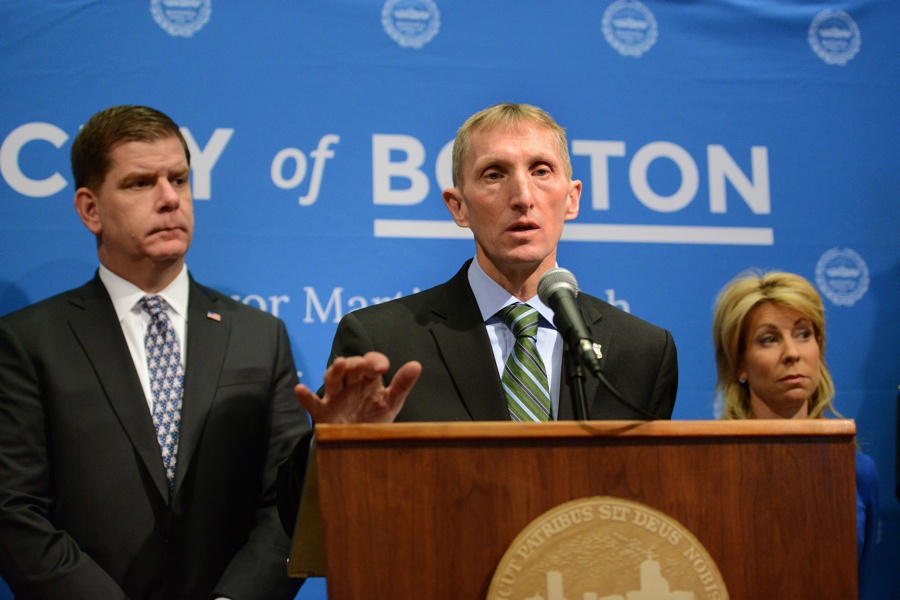BPD Commissioner William Evans Denies Rumors He Plans to Leave
He and Mayor Marty Walsh say a report that he's heading to Boston College is untrue.

Mayor’s Office Photo by Isabel Leon
Update: Both Evans and Walsh have now denied the rumors. “He’s the police commissioner,” Walsh said, according to the Boston Herald. ““I hate these rumors … they’re not true,” said Evans.
Earlier: In what would be a second major departure under Mayor Marty Walsh in just a few days, Boston Police Commissioner William Evans reportedly plans to leave his post of more than four years. If the reports are true, Walsh will have two critical roles to fill.
In a report Thursday night, citing unnamed sources, WBZ says Evans will take a job heading the Boston College Police Department, taking over for outgoing Chief John King, who announced in April he would retire in August. BPD has not confirmed the move, and both BC and the mayor’s office declined to comment on Friday.
BREAKING: Sources tell WBZ that Boston Police Commissioner Bill Evans is leaving the department. He is going to Boston College to lead their police department. Evans joined Boston Police in 1982.
— WBZ | CBS Boston News (@wbz) June 28, 2018
Evans, who was born in South Boston and graduated from Suffolk University in 1982, has headed the Boston Police Department since November of 2013, when then-Mayor Tom Menino moved him up from his role as superintendent to that of interim commissioner after the departure of Ed Davis. In January of 2014, Walsh officially tapped him for the role. During his tenure with BPD Evans oversaw the city’s response to Occupy Boston and the aftermath of the Boston Marathon bombing (then serving as superintendent in charge of the Bureau of Field Services, Evans famously finished the Marathon that year, then got back to work on the ensuing manhunt).
His exit would add yet another major leadership decision to Walsh’s plate and offer the mayor, who was re-elected in a landslide last year, an opportunity to set the course for two major, often politically charged city departments. Boston Public Schools Superintendent Tommy Chang announced late last week he would step down, three years into a five-year contract, reportedly amid a rift with City Hall over his handling of a school start time proposal and in the wake of a lawsuit targeting school officials’ alleged practice of sharing information about undocumented students in some cases with law enforcement and ICE, which Chang denies. Laura Perille, leader of the education nonprofit EdVestors, will take his place for now.
A new commissioner would have a lot to consider. In his role, Evans has not shied away from criticizing the nation’s gun laws—he told us in 2016 the weapons were the biggest threat currently facing the city—and has emphasized efforts including City Hall-sponsored “peace walks” to bridge the gap between police and neighborhoods, at a time when tension between law enforcement and communities of color has taken center stage nationally. His department has also been at the center of a debate about privacy rights and the importance of community input amid the expanding use of drones and other new technology in surveillance. The department quietly bought three drones last year. Another contentious issue in policing has unfolded under his tenure: Body cameras. After initially pushing back on the idea of fitting Boston Police officers with the devices, he seems to have come around on the issue following a pilot program that wrapped up this year. In April, Walsh committed $2 million in funding for a body camera program.
Of course, rumors are sometimes wrong. We’ll update when we know more.


